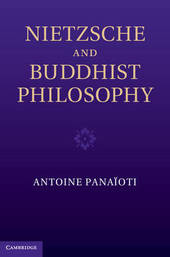
|
Nietzsche and Buddhist Philosophy
Hardback
Main Details
| Title |
Nietzsche and Buddhist Philosophy
|
| Authors and Contributors |
By (author) Antoine Panaioti
|
| Physical Properties |
| Format:Hardback | | Pages:260 | | Dimensions(mm): Height 229,Width 152 |
|
| Category/Genre | Western philosophy - c 1600 to c 1900
Oriental and Indian philosophy
Buddhism |
|---|
| ISBN/Barcode |
9781107031623
|
| Classifications | Dewey:193 |
|---|
| Audience | | Professional & Vocational | |
|---|
|
Publishing Details |
| Publisher |
Cambridge University Press
|
| Imprint |
Cambridge University Press
|
| Publication Date |
6 December 2012 |
| Publication Country |
United Kingdom
|
Description
Nietzsche once proclaimed himself the 'Buddha of Europe', and throughout his life Buddhism held enormous interest for him. While he followed Buddhist thinking in demolishing what he regarded as the two-headed delusion of Being and Self, he saw himself as advocating a response to the ensuing nihilist crisis that was diametrically opposed to that of his Indian counterpart. In this book Antoine Panaioti explores the deep and complex relations between Nietzsche's views and Buddhist philosophy. He discusses the psychological models and theories which underlie their supposedly opposing ethics of 'great health' and explodes the apparent dichotomy between Nietzsche's Dionysian life-affirmation and Buddhist life-negation, arguing for a novel, hybrid response to the challenge of formulating a tenable post-nihilist ethics. His book will interest students and scholars of Nietzsche's philosophy, Buddhist thought and the metaphysical, existential and ethical issues that emerge with the demise of theism.
Author Biography
Antoine Panaioti is lecturer in philosophy and post-doctoral fellow at the Centre of Research in Ethics at the University of Montreal.
Reviews'... Antoine Panaioti's Nietzsche and Buddhist Philosophy takes first place as the best book of my reading year. Beautifully written, a heroic feat of erudition, and an intimate and sympathetic reading of both Nietzsche and classical Buddhist philosophy, this book enacts the ideal whose contours it seeks to define and celebrate in its twin subjects - the ideal of great health that overcomes the despair of nihilism and celebrates the uncanniness of existence ...' Wendy C. Hamblet, Metapsychology Online Reviews
|